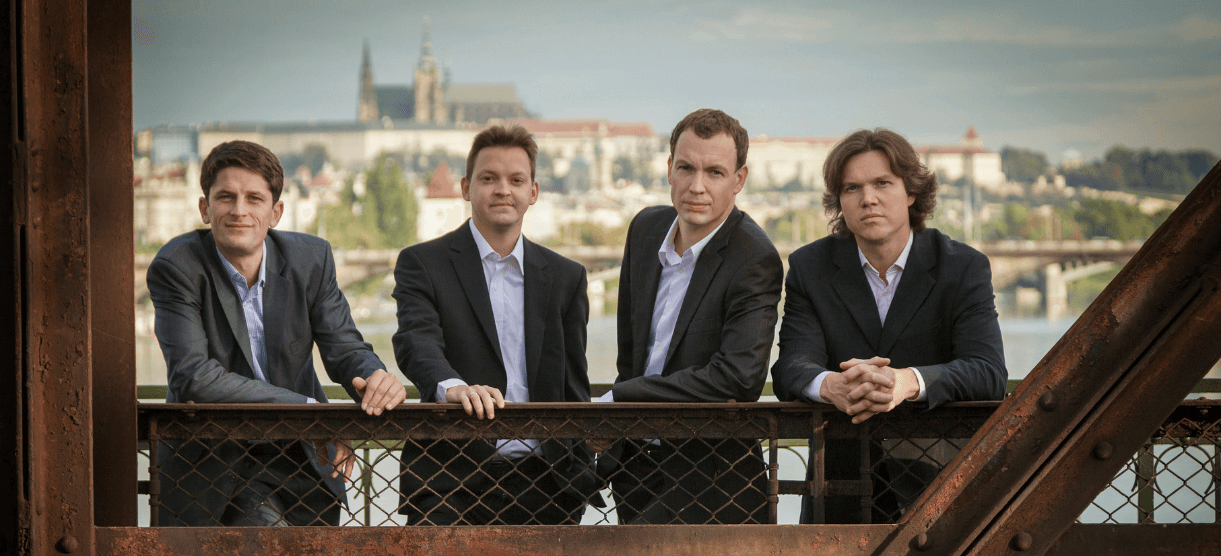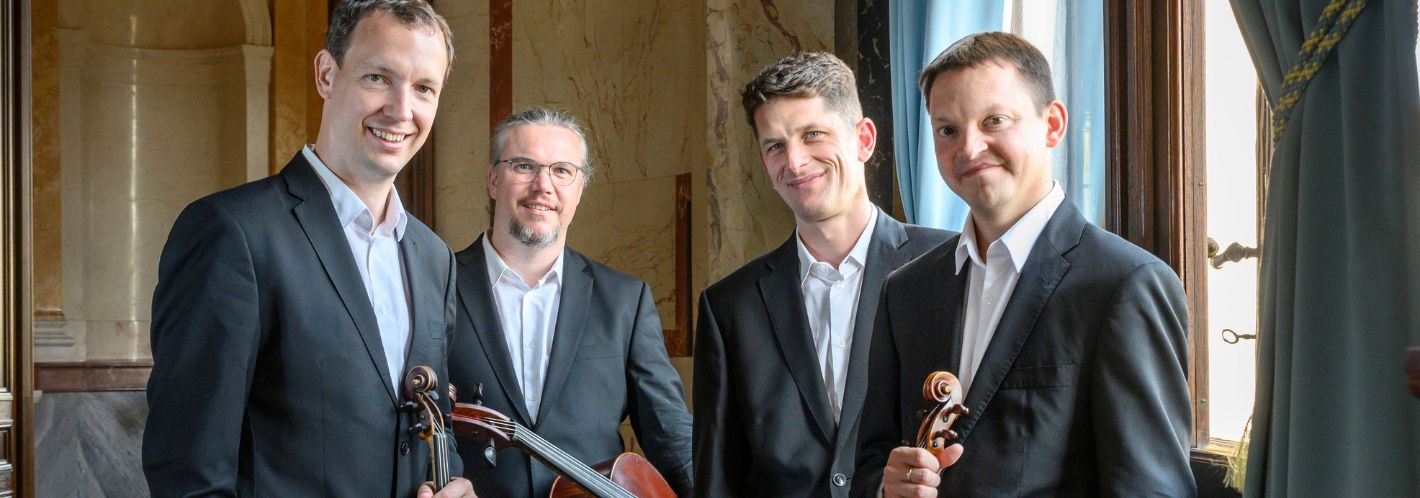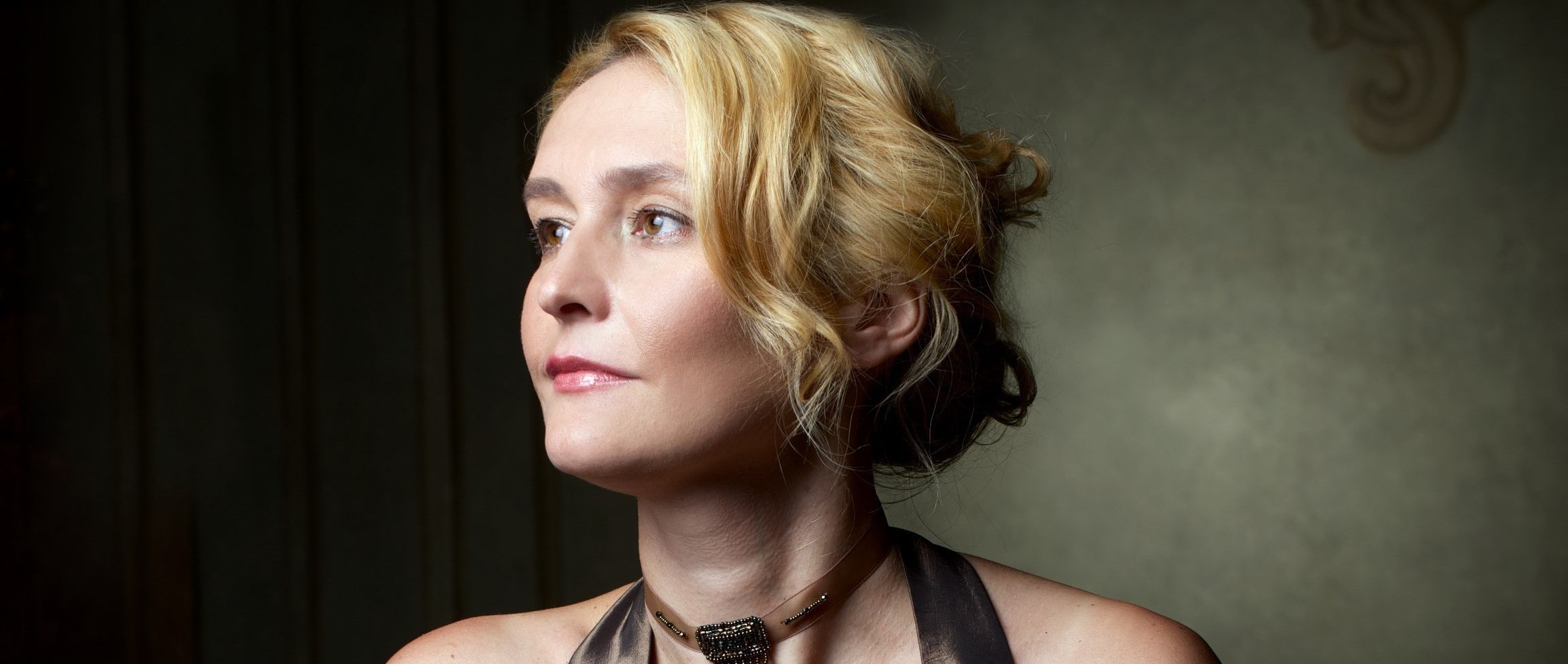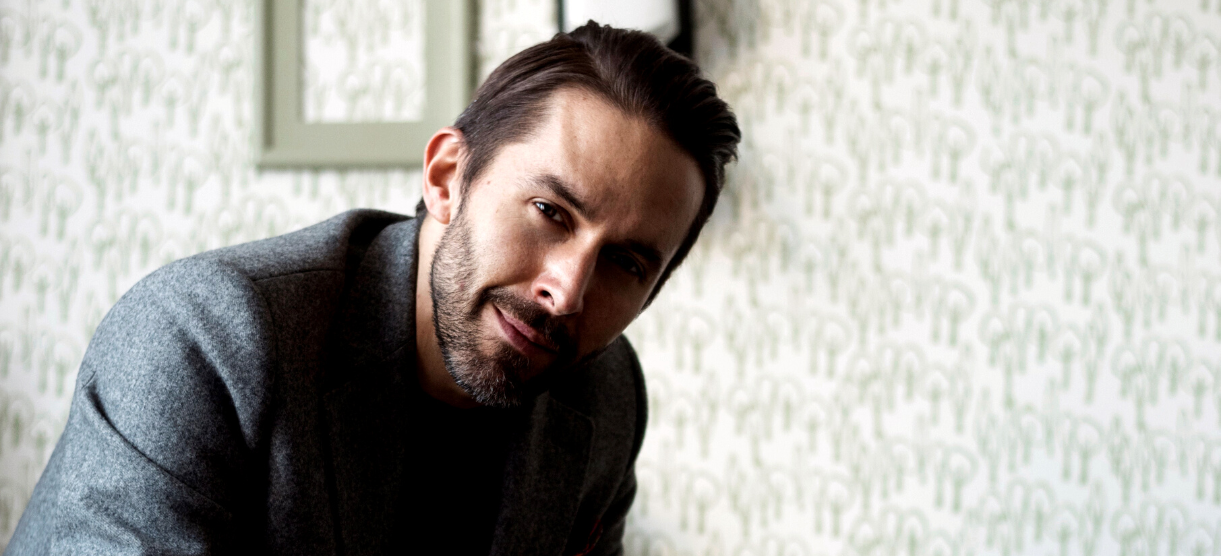
Antonín Dvořák: String Quartet No. 5 in F Minor, Op. 9, B. 37
Ottorino Respighi: Il Tramonto
Viktor Ullmann: The Tale of the Love and Death of Flag-Bearer Christoph Rilke (arr. for string quartet Harry-Imre Dijkstra)
The night before a battle, a night of love, timeless desire: all of this describes each of the three pieces of music that will be performed by the Bennewitz Quartet in the powerful acoustics and atmosphere of St Agnes Convent. Its patron, Head of Prague Conservatoire Anton Bennewitz, was a member of the ensemble that was supposed to perform the original premiere of String Quartet No. 5 in F Minor. The piece feels as though Antonín Dvořák had won his battle to find his distinctive musical style that would later help him conquer the world by combining his melodic diversity, conciseness, and enormous imagination.
The poetic Il Tramonto (The Sunset) by Ottorino Respighi will take the audience to the world of erotic sadness, where they will not be able to help themselves but wonder about Tristan and Isolde, or Pelléas and Mélisande. The interweaving of the string quartet with the mezzosoprano Markéta Cukrová promises a fantastic experience. Another human voice – in the form of recitation – will also be featured in the melodrama The Tale of the Love and Death of Flag-Bearer Christoph Rilke. This poem about a passionate, amorous night before a battle was set to music by Viktor Ullman during his forced stay in the Theresienstadt ghetto.
The Bennewitz Quartet is one of the leading international chamber ensembles, a status confirmed not only by their victories in two prestigious competitions—Osaka in 2005 and Prémio Paolo Borciani in Italy in 2008—but also by critical acclaim. As early as 2006, the German Frankfurter Allgemeine Zeitung wrote: “… the music was remarkable not just for its clarity of structure, but for the beautiful tonal palette and purity of intonation in its execution. Only very rarely does one experience such skillfully crafted and powerful harmonies... Great art.” The ensemble has received various awards on the Czech music scene as well. In 2004, the quartet was awarded the Prize of the Czech Chamber Music Society, and in 2019, the four musicians won the Classic Prague Award for the Best Chamber Music Performance of the Year.
The quartet regularly performs at major venues both in the Czech Republic and abroad, including Wigmore Hall in London, Musikverein in Vienna, Konzerthaus in Berlin, Théâtre des Champs-Élysées in Paris, The Frick Collection in New York, Seoul Arts Center, and the Rudolfinum in Prague. They are frequent guests at renowned festivals such as the Salzburger Festspiele, Lucerne Festival, Rheingau Musik Festival, Kammermusikfest Lockenhaus, and the Prague Spring. The group has had the privilege of working with outstanding artists such as Jean-Yves Thibaudet, Alexander Melnikov, Vadim Gluzman, Isabel Charisius, Pietro de Maria, Reto Bieri, Danjulo Ishizaka, and others.
The Bennewitz Quartet takes particular pleasure in performing on the Czech music scene. A highlight of their career was their collaboration with the Czech Philharmonic and conductor Jiří Bělohlávek in a performance of Bohuslav Martinů’s Concerto for String Quartet and Orchestra. The group also recorded both quartets by Leoš Janáček for Czech Television in the unique setting of Villa Tugendhat in Brno. Czech Radio regularly records the quartet’s major concerts.
The members of the quartet place great emphasis on an inspiring and sometimes challenging choice of repertoire. In 2012 and 2015, they performed all six of Bartók’s string quartets in a single evening at Maggio Musicale Fiorentino and in Uppsala, Sweden. In 2014, they premiered The Songs of Immigrants by Slavomír Hořínka at Konzerthaus Berlin. In 2019, they added a new album to their discography featuring the works of persecuted Jewish composers—Hans Krása, Viktor Ullmann, Erwin Schulhoff, and Pavel Haas—released under the Supraphon label.
In the 2024/25 season, the Bennewitz Quartet will return to several European venues, including Wigmore Hall in London, Laeiszhalle in Hamburg, and Konzerthaus Berlin, performing the string quintets of Dvořák and Brahms with Veronika Hagen. They will also tour the United States, making their debut in Providence, Houston, and Tucson, while returning to the Music and Beyond Festival in Ottawa and The Harvard Musical Association in Boston. Meanwhile, various concert projects will continue in the Czech Republic. The final concerts of their complete cycle of Dvořák’s string quartets will take place in September as part of the Dvořák Prague Festival. Later that month, a new CD featuring string quartets by composers who “used to play together”—Haydn, Mozart, Vaňhal, and Dittersdorf—will be released under the Supraphon label.
Since 1998, the quartet has borne the name of violinist and director of the Prague Conservatory, Antonín Bennewitz (1833–1926), who played a crucial role in establishing the Czech violin school. Among his most significant students were Otakar Ševčík and František Ondříček, as well as Karel Hoffmann, Josef Suk, and Oskar Nedbal, who—under Bennewitz’s influence—formed the famous Bohemian Quartet.
source: Bennewitz Quartet

Markéta Cukrová belongs to the most sought-after Czech soloists in the field of historically informed music. She gives guest performances in the National Theatre in Prague, National Theatre in Brno, and Košice State Theatre. She regularly cooperates with Italian ensemble Mala Punica and Belgian Club Mediéval, in the Czech Republic she regularly performs with Collegium Marianum, Musica Florea, Czech Ensemble Baroque or Ensemble 18+. In recent years, she has been short-listed two times for the Opera Plus Award for the Best Opera Singer of the season and nominated for two major opera awards of the Czech Republic (Thalia, Classic Prague Awards).
The mezzo-soprano Markéta Cukrová is a unique phenomenon in the field of Czech vocal music. For her spectacular versatility and her sense of style, she ranks among the most sought-after singers in the field of “early music” up to 20th century classical music. She performs with many ensembles that offer top-class interpretations of both the Medieval and Baroque music (La Risonanza, Mala Punica, Les Muffatti, Collegium Marianum, Ensemble Tourbillon, Collegium Vocale Gent, Collegium 1704, Musica Florea, Ensemble Inégal, Czech Ensemble Baroque, Wroclaw Philharmony, {oh!} Orkiestra Historyczna, Göttingen Festival Orchestra). Markéta has also participated in more than twenty recordings of early music with ensembles mentioned above.
Her performances of the early song repertoire from the turn of the nineteenth century (Haydn, Tomaschek, Berlioz) accompanied by fortepiano are highly prized, as well as her recordings of 8 Italian arias by J. D. Zelenka (Ensemble Tourbillon) and her recent recording of J. J. Ryba’s Stabat Mater together with the ensemble L'Armonie Terrena, which was awarded Diapason d'Or. The newest release represents the whole of Moravian duets by Antonín Dvořák accompanied by composer's own instrument (precious Bösendorfer, Vienna 1879). She also acted as the music dramaturge of the 9 Weeks of Baroque festival which was held during the project Pilsen – European Capital of Culture 2015.
Markéta is also engaged in pedagogical activities in the form of courses and lessons focused on the technique of singing and interpretation of vocal music. She also translated a book of interviews with famous teacher Margreet Honig which is about techniques and teaching of singing and was published under the title True Singing.
She is also known for her notable opera appearances: Her performance as Dardano in Händel’s Amadigi di Gaula at the Händelfestspiele in Göttingen, Germany, received high critical praise followed by an invitation to perform in a solo recital. She also guests in the Košice State Theatre (Handel/Alcina), the National Theatre Brno (Offenbach/ Les Contes d'Hoffmann, Martinů/The Miracles of Mary, Purcell/ Dido and Aeneas, Saariaho/ L'Amour de loin, Rossini/ Le comte Ory, Offenbach/ Les Contes d'Hoffmann, Ivanovič/Monument), the National Theatre Opera in Prague (Monteverdi/Orfeo, Händel/Rinaldo, Martinů/Julietta) and the The National Moravian-Silesian Theatre Ostrava (Britten/The Rape of Lucretia, Gluck/Ifigenia in Aulis, Martinů/Julietta).

He was born into a family of actors on 31 March 1980 in Uherské Hradiště. Daniel graduated from The Academy of Performing Arts in Prague, the Theatre Faculty, in a class taught by Boris Rösner and Eva Salzmannová. Since 2004, he has been engaged in the Vinohrady Theatre, and has been a guest on various other stages (The National Theatre Brno, Městské divadlo Mladá Boleslav, The Pod Palmovkou Theatre, The South Bohemian Theatre, 3D Company, and Indigo Company). In 2017, he won the Thalia Award for the best male performance in drama. Daniel works in TV, film, and radio productions, both as a live actor and voice over for dubbing, and records audiobooks.

The Convent of St. Agnes in the 'Na Františku' neighbourhood of Prague's Old Town is considered the first Gothic structure not only in Prague but in all of Bohemia. It was founded by King Wenceslas I in 1233–34 at the instigation of his sister, the Přemyslid princess Agnes of Bohemia, for the Order of Saint Clare which Agnes introduced into Bohemia and of which she was the first abbess. The convent was preceded by a hospital. The 'Poor Clares' originated as an offshoot of the Order of St. Francis of Assisi, and the convent was at one time known as the Prague Assisi. Agnes was an outstanding figure in religious life of the thirteenth century. Besides this Clarist convent she also founded the only Czech religious order – the Hospital Order of the Knights of the Cross with the Red Star. She was canonized in 1989.